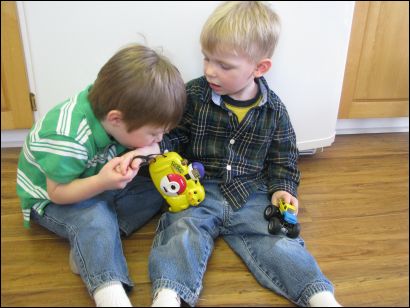Biting Child:
How Do You Stop Him?
You know what’s funny about the topic of a biting child?
If your child is the victim (the one who gets bit), you get very angry. You blame the biter’s parent for poor parenting skills and you hold a grudge on the biter for being a “bad kid”. You don’t know why your child care provider doesn’t get it to stop.
If it is your child who is the biter, you can’t understand why the other parent is so upset. It’s just normal childhood behavior. You’re doing everything possible to get your child to quit biting. And why is the child care provider threatening to kick you out of daycare?
You should know:
- Biting is normal childhood behavior.
- The biter is not a "bad kid".
- The biter should not be kicked out of daycare.
- The parents and the child care provider should work together to resolve the problem.
Okay, so how do you solve the problem?
First, you need to understand why children bite.
There are several different reasons a child may choose to start biting. It’s crucial to determine the reason the child is biting in order to take the correct approach to stopping it.
Possible Reasons:
- A biting child is frustrated or angry and does not have the vocabulary to express their feelings.
- The child may be teething and trying to find a way to relieve the pain.
- A young child may be discovering their different sensories.
- It may be self-defense for a child who has been bitten by another child.
- It’s possibly a copy-cat affect because they’ve seen another child bite.
- Some children seek attention, not caring whether the attention is good or bad.
- They may have discovered "cause and affect." "When I bite someone, I receive quite a reaction."
Solutions:
Almost every child tries biting at some point in their toddler years. Your reaction and how you handle the situation can deter or promote further biting incidences.
For a first-time biter, the solution tends to be pretty easy. Explain to the child, at their level, that they can’t bite people. Let them know it hurts. If it was you that was bitten, it’s okay to overreact to show them they hurt you.
- If you feel it was teething pain that caused the biting, give them an alternative to bite on.
- If you feel it was any of the other reasons listed, help them expand their vocabulary to express their feelings. Even if it’s a very small child, you can teach them to say "no" when they’re angry or frustrated.
If you have a habitual biting child, the solution isn’t quite so easy. You need to monitor a habitual biter very closely. If it becomes necessary to protect the other children, require the biting child to follow you wherever you go. Two things will be accomplished. One, the child cannot bite another child with you supervising so closely. And two, the child will get tired of following you around and choose more appropriate behavior.
- Try to figure out what situations trigger the biting. You can choose to either eliminate those situations for the biting child or make sure you’re monitoring the child very closely during these times to "catch them in the act."
- If you see the child bite, firmly say, "Stop Biting!" If you can react right at the time of the bite, the response affect on a child is much greater. Pull the child away from the activity. Explain that they hurt people with this behavior. Ask them how they would feel if someone bit them. Is that how they want to make people feel?
- If you didn’t see the biting happen, you will probably approach the situation with a biter just sitting there and the victim crying loudly. All your attention should go to the child who was bitten. Calmly tell the biter that what they did was wrong and that they hurt the other child, but then return all your attention to the victim with hugs and kisses. When you do this, you’re letting the biter no they will not get a reaction from you when they display this behavior.
Don’t:
- Don’t bite a child to show them how it feels.
- Don’t use hot sauce in their mouth as punishment.
- Don’t overreact. Biting is natural childhood behavior and when handled properly, is a very short-term problem.
Do:
- Work together. Parents and daycare providers need to work as a team to make sure reactions to the biting are consistent between daycare and home.
- Praise the child when you see them handle a stressful situation in the appropriate manner.
- Remind the biting child every single morning to not bite their friends. It hurts their friend and makes them cry.
And Just to Lighten the Topic of Biting...
Want to look around some more?...
Exit Biting Child and Return to Providers Page
or
Return to DaycareAnswers Home Page
 |
Marcia Reagan is the creator of DaycareAnswers and lives in Central Minnesota with her husband and two children. She's been an in-home daycare provider for over twenty years and loves to share her experience and passion for daycare with other providers. |






